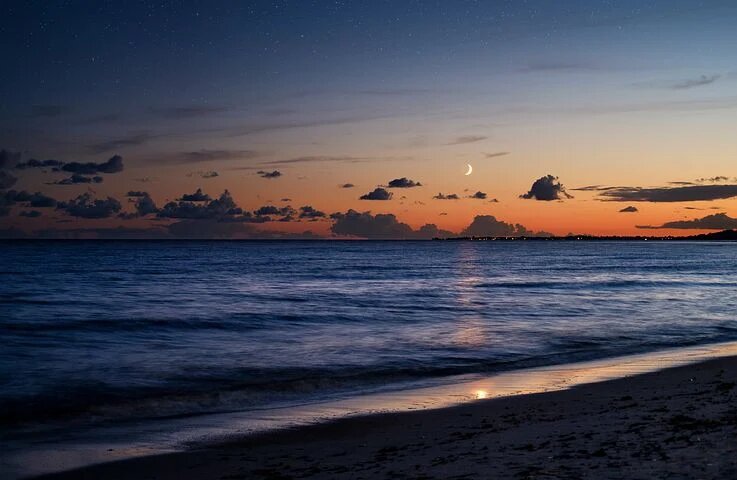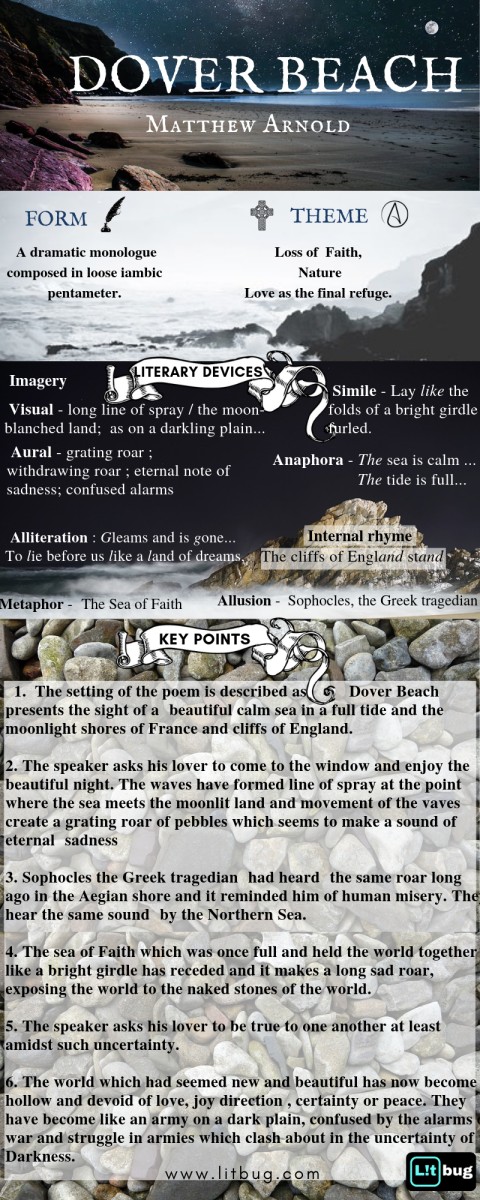
Dover Beach by Matthew Arnold has been considered among the representative poems to capture the mood of the Victorian Age. Dover Beach is replete with questions the age had been grappling with questions on various themes like religion, morality, faith, doubt and knowledge, among others. Faced with scientific facts which threatened to challenge the age-old belief system of Christianity, the withdrawal from religion, accelerated by advancements in scientific thought had unforeseen ramifications on the idea of morality, mortality and the nature of human existence. Arnold grapples with such questions in Dover Beach, a poem which is marked by an elegiac tone befitting the concerns of the age which found itself in the cusp of change and uncertainty. Using the image of the beach lying in the cusp of the sea and land and subjected to the forceful pushing and pulling of the sea waves, Dover Beach represents the concerns of an age which lay between the opposing forces of religion and rationality.
First published in 1867 under the collection New Poems , Dover Beach is arguably the most well remembered of Arnold’s poems. Considering that Arnold was more of a cultural critic than a poet, the immense success that this particular poem has enjoyed is truly remarkable. One look at the poem is sufficient to understand why it must be the case, for Dover Beach isn’t just a poem, it is the testament of an age and its preoccupations, its dilemmas, questions, insecurities and fears.
Got No Time? Check out this Quick Revision by Litbug
Dover Beach : Summary and Analysis
Dover Beach Analysis Stanza 1
Dover Beach Analysis, Lines 1-6
The sea is calm tonight.
The tide is full, the moon lies fair
Upon the straights; on the French coast the light
Gleams and is gone; the cliffs of England stand,
Glimmering and vast, out in the tranquil bay.
The poem opens with the sight of a calm, moonlit sea in a full tide. The successive use of the preposition ‘the’ in the first stanza creates a measured pace in the poem which is at once calm and serious and creates a brooding background for what is to follow.
The sea is calm tonight.
The tide is full, the moon lies fair
Upon the straights; on the French coast the light
Gleams and is gone;
This literary device is known as anaphora and it helps in drawing the reader (quite like the waves) towards the imagery of the sea.
The light on the French coast has faded out and the cliffs of England boldly stand , beautifully bathed in the lunar light despite being exposed to the buffeting of the sea waves. The visual imagery is heightened by the use of poetic devices which effortlessly complement the former. The alliteration used to describe the light on the French coast which “gleams and is gone” captures the fading beauty of the moonlight. On the other side (also literally), “the cliffs of England stand glimmering and vast”, as if to resist the external pressures of the sea wave through the technical stability of the internal rhyme.
Dover Beach Analysis, Lines 7-15
Come to the window, sweet is the night -air !
Only, from the long line of spray
Where the sea meets the moon-blanched land,
Listen! you hear the grating roar
Of pebbles which the waves draw back, and fling,
At their return, up the high strand,
Begin, and cease, and then again begin,
With tremulous cadence slow, and bring
The eternal note of sadness in.
The poem then switches from the third person to the first person where the narrator asks his beloved to come to the window and listen to the sound of the sea, a sad melody. As is evident, the poem also shifts from the visual imagery to aural imagery to provide a more wholesome sensory experience of the sea. Dover Beach, the point where “the sea meets the moon-blanched land” resounds with the grating roar of pebbles which are drawn back and forth by the powerful waves thereby recreating the powerful soundscape of the sea. The waves are rendered animate and they seem to have a will of of their own with which they ‘fling‘ the pebbles upon their return. Here, one may look at what’s happening around the time Arnold is writing the poem. This will help us better understand why the mood of the poem is the way it is. The authority of religion has collapsed. A rapid progress in the natural sciences based on the works of Darwin , Lamarck and Lyell among others have displaced the authority of the Biblical God. Specifically, Charles Lyell’s Principles of Geology has made the claim that geological formations significantly predates the age attributed to them by the Biblical Creation Story. The “eternal” sea then seems to have a will of its own, completely unregulated by a Creator. Human life has then become like a pebble which the waves fling whichever way they wish and human existence is overwhelmed by the disinterested working of this eternal current and not the plans of a benevolent God as was earlier believed.
Arnold makes use of a caesura due to which the rhythm of the stanza mimics the movement of the sea waves. The masterful placement of commas captures the motion of waves which:
“Begin, and cease, | and then again begin,
With tremulous cadence slow, and bring
The eternal note of sadness in.
The note is eternal. The note is sad. The sea is no longer what it used to be. It lacks a transcendental significance and doesn’t elicit a spiritual response anymore. No higher ideal. No deeper meaning. It’s meaning stops at the literal. It’s energy has become a mere physical force and its music, an eternal monotony.
Dover Beach Analysis, Stanza 2
Sophocles long ago
Heard it on the Aegean, and it brought
Into his mind the turbid ebb and flow
Of human misery; we
Find also in the sound a thought,
Hearing it by this distant Northern Sea.
The meditative poem then turns to another age when a Greek playwright must’ve been in a similar mood by the Aegean Sea. Sophocles was a reputed playwright of Greek tragedies like Oedepus Rex, Electra and Antigone and had written about the Greek victory and defeat in Persian and the Peloponnesian Wars respectively: so much for the ebb and flow of human misery. By linking Sophocles and the Aegean shore through the waves which reach him (the poet) in the English Northern Sea , Arnold seems to suggest that they are under similar circumstances where they are witnessing the eternal cycles of the ebb and flow of human misery. The pessimistic tone arise from the fact that he uses human misery as the reference point against which the ebb and flow of the tide may be measured.
Notice the combined effect of the caesura and internal rhyme in the fourth line of the second stanza .
…the turbid ebb and flow
Of human misery : we
find also in the sound a thought
The internal rhyme highlights how the present situation ‘rhymed‘ with that of the past and the caesura ‘we‘ immediately transports the reader from that past back to the present. The poet seems to identify with the tradition of writing which was intensely preoccupied with the eternal ebb and flow of human misery.
It is worth noting that Arnold was influential in reviving the focus on Greek literature as one of the chief influencers of Western thought. He often saw Art as the force that could hold the society intact now that religion was crumbling down and could no longer provide a direction to the society it once had. By likening his contemplative mood to that of a playwright in an age gone by, Arnold draws attention to the figure of the artist who can witness the “eternal ebb and flow of human misery” and provide a possible refuge in the face of such a force in the form of his/her art.
The eternal ebb and flow of human misery which Sophocles spoke about seems to be all the more relevant in Arnold’s time where the the withdrawing waves of the sea of faith exposes the individual to the naked shingles of the world.
Dover Beach Analysis, Stanza 3
The Sea of Faith
Was once, too, at the full, and round earth’s shore
Lay like the folds of a bright girdle furled.
But now I only hear
Its melancholy, long, withdrawing roar,
Retreating, to the breath
Of the night-wind , down the vast edges drear
And naked shingles of the world .
The sea surrounding the Dover Beach is further transformed to a metaphoric realm and is used to show how a Sea of Faith is retreating from a state of fullness and what are the consequences of this retreat. An effective sartorial simile likens the Sea of Faith to “the folds of a bright girdle furled” enveloping the world. Notice the consonance created by the l and r sounds which communicates the pleasant state of affairs when the Sea of Faith was full and it “Lay like the folds of a bright girdle furled.” However, it is no longer the case at present. There is an ebb in the Sea of Faith at the moment and everything has retreated to darkness of the night-wind.
Arnold was intensely aware of the questions Victorian England of his day had been grappling with and more so of his role in engaging with them. The displacement of Faith by scientific thought had exposed the world to cold logic of accepting anything only on the basis of proof. Faith was no more a factor. Infact, the acceptance of anything on the basis of ‘faith’ ran contrary to the scientific temperament of the age. The Sea of Faith which had provided coherence to human existence and had provided meaning to the life of many, which had held the world together like a bright girdle had now become fraught with doubt. The withdrawing waves of Sea of Faith had exposed the individual to the stones of harsh realities of the world. In short, the rational world had become more faith-less and conversely and as Arnold felt, more hope-less as well.
One important aspect of Dover Beach is that it uses certain themes which link successive stanzas, creating a series of unbroken ideas, quite like the unbroken, successive tides of the sea waves. To illustrate it further, the first stanza ends with the idea of the ‘eternal note of sadness ‘ brought by the waves. This idea of eternity is extended in the second stanza which throws the reference of Sophocles who heard the same sound in Aegean shore and is today heard in the ‘distant northern sea ‘ by the poet. The word ‘sea‘ in the final line of the second stanza is linked to the “Sea of Faith” with which the third stanza begins. Similarly, the third stanza ends with the withdrawing roar of the sea which exposes the individual to the’ naked shingles of the world‘. The word world is then used as an entry point to the final stanza of the poem :
Ah, love, let us be true
For the world which seems
To lie before us……..
This manner of using a particular word to link the ideas of the successive stanza creates an unbroken thread of meaning quite like the unbroken, successive waves of the sea and the thematic trough mingles with the technical crest of the sea waves.
Dover Beach Analysis, Stanza 4
Ah, love, let us be true
To one another ! for the world, which seems
To lie before us like a land of dreams,
So various, so beautiful, so new,
Hath really neither joy, nor love, nor light,
Nor certitude, nor peace, nor help for pain;
And we are here as on darkling plain
Swept with confused alarms of struggle and flight,
Where ignorant armies clash by night.
The final stanza makes a call to the beloved to at least be true to each other. This is the least that can be done. Conversely , this is also the most that can be made of a world where the long established truths around which life once revolved has come undone. In a world where religious authority over Truth is quashed, where the wave of Faith is ebbing and where God had become just a god, love and faithfulness towards one another was the only respite that anyone could attempt to seek. With the withdrawing of the moonlit sea of faith to the breath of the night-wind (note the contrasting use of darkness and light), the world which was previously bright and beautiful now has no joy, love, peace, light, stability in time of need or help in time of pain. In other words, due to the lack of faith the world has become sadder, darker more uncertain and less compassionate. Notice the successive repetition of the conjunctions ‘so’ and ‘nor’ in the fourth stanza :
To lie before us like a land of dreams,
So various, so beautiful, so new,
Hath really neither joy, nor love, nor light,
Nor certitude, nor peace, nor help for pain;
Here we see Arnold making full use of a literary device called polysyndeton which heightens the effect of what is being said by repeating conjunctions in succession. The repetition of ‘so’ and ‘nor’ in the abovementioned lines heightens the importance of what has been lost and emphasizes what is lacking in the present world.
All that seemed eternal was slowly being eroded due the constant bashing of the beach by new and ‘strange’ waves of thought and culture. A very important word used in the final stanza is certitude. The toppling of hitherto unchallenged hierarchy of religion by the scientific rationalism and the attack on the validity of Truth itself created a void in people’s lives which couldn’t completely be filled by reason. The world had become a lot more uncertain as the previous order provided by religion collapsed into chaos of skepticism and ruthless rationality. The idea of utter chaos is brilliantly captured in the final line of the poem :
And we are here as on a darkling plain
Swept with confused alarms of struggle and flight ,
Where ignorant armies clash by night.
The poet leaves the reader with the vison of what the world has become: he provides a scene which reflects complete chaos. Troubled and confused, people have become like armies clashing in the dark without any certainty of which way to turn to. They act without knowing and this action without knowledge is dangerous. (The use of the word darkling is typical of this age which was grappling with the realities of a bleak world. Thomas Hardy, another Victorian poet uses the word in his poem The Darkling Thrush).
One may read the lines as an allusion to an instance on the account of Peloponnesian War by Thucydides which describes how the Athenian army fought on a beach at night (darkling plain) during the invasion of Sicily. Confided by the darkness and the utter chaos which surrounded them, the army ended up killing each other. The world has become a darkling plain where confusion and violence abounds, threatening the decimation of one and all. And this time, there is no escape to faith.
Dover Beach : About the Author
Widely regarded as the representative Victorian critic, Matthew Arnold was born on Christmas eve of 1824 in Laleham, Middlesex. His father was the headmaster of Rugby School and Arnold was encouraged to read extensively from a very early age. Arnold later went to Oxford to study the classics. While at Oxford, he won the prestigious Newdigate Prize for his poem Cromwell. Arnold dedicated a couple of poems to his Alma mater and even coined the phrase “the city of dreaming spires ” which serves as Oxford’s sobriquet to this day. He would later be made Oxford’s Professor of Poetry.
Arnold worked as an Inspector of Schools for a considerable period of time which allowed him to travel across the continent. He devoured much of English, French and German literature, familiarizing himself with the Eastern and Western systems of thought. The most important works of Arnold include his essays Culture and Anarchy, Literature and Dogma, Critical Essays and poems like and Endocles on Etna, Dover Beach and Sohrab and Rustum among others.
To Arnold must be credited the prime position of being the representative social and literary critic of the Victorian age. He was intensely engaged with the questions and moral dilemmas Victorian England had been grappling with. The themes of Science and Religion, Faith and Doubt and the role of Culture in providing a sense of stability in times of chaos finds its resonance in most of his works, including his poetry.
Arnold died on 15th April 1888 due to heart failure.


